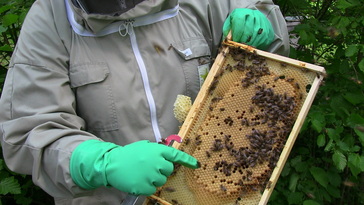
I always thought that bees express the substance of life, the buzz of nature, a metaphor for the buzz of humanity and after the workshop remain even more convinced that they should be more highly regarded as indicators of a healthy environment; discussing how bees communicate, navigate, their needs and their decline, seemed to say much about our relationship with the world. Traditionally you talk to the bees, tell them about family matters, births and bereavements, the bees respond in producing honey. But back to the workshop, much discussion about monitoring bee populations, how they forage, their health and survival, urban bees and questions about how we might embrace bees as natural indicators of a healthy environment having the foresight to move beyond conventional narrowly focused social and economic indicators to placing other indicators alongside and giving them equal weight.
Discussion moved onto bee gardens, transportable apiaries located throughout the city; in Birmingham we decided that we should monitor the conversations, set up a live stream video cam of bee activities, perhaps even be able to observe the bees dancing, invite people to log onto the site and view it all on the giant screen in the city centre! Instead of the standard corporate advertising or usual messages, there for all to see, would be the natural world of the honeybee expressing our understanding of nature, our desire to embrace the bees as indicators, relaying our messages and observations. Have a look at the Bee Skyscraper in Buffalo, USA
So the workshop on honeybees required us to consider our human existence and current relationships with the world, to build upon a very old one to co-design an intervention by understanding more fully a ‘bee perspective’ which prompts us to consider what other perspective currently lie outside our experience and what other metaphorical or real bee type conversations remain to be experienced and explored.
Thanks to Pershore College, the opportunity to renew old acquaintances and make new ones with the bees.
 RSS Feed
RSS Feed
